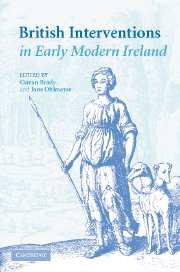Book contents
- Frontmatter
- Contents
- Notes on contributors
- Acknowledgements
- Aidan Clarke: an appreciation
- Conventions
- List of abbreviations
- 1 Making good: New perspectives on the English in early modern Ireland
- 2 The attainder of Shane O'Neill, Sir Henry Sidney and the problems of Tudor state-building in Ireland
- 3 Dynamics of regional development: processes of assimilation and division in the marchland of south-east Ulster in late medieval and early modern Ireland
- 4 The ‘common good’ and the university in an age of confessional conflict
- 5 The construction of argument: Henry Fitzsimon, John Rider and religious controversy in Dublin, 1599–1614
- 6 The Bible and the bawn: an Ulster planter inventorised
- 7 ‘That Bugbear Arminianism’: Archbishop Laud and Trinity College, Dublin
- 8 The Irish peers, political power and parliament, 1640–1641
- 9 The Irish elections of 1640–1641
- 10 Catholic Confederates and the constitutional relationship between Ireland and England, 1641–1649
- 11 Protestant churchmen and the Confederate Wars
- 12 The crisis of the Spanish and the Stuart monarchies in the mid-seventeenth century: local problems or global problems?
- 13 Settlement, transplantation and expulsion: a comparative study of the placement of peoples
- 14 Interests in Ireland: the ‘fanatic zeal and irregular ambition’ of Richard Lawrence
- 15 Temple's fate: reading The Irish Rebellion in late seventeenth-century Ireland
- 16 Conquest versus consent as the basis of the English title to Ireland in William Molyneux's Case of Ireland … Stated (1698)
- Principal publications of Aidan Clarke
- Index
8 - The Irish peers, political power and parliament, 1640–1641
Published online by Cambridge University Press: 31 July 2009
- Frontmatter
- Contents
- Notes on contributors
- Acknowledgements
- Aidan Clarke: an appreciation
- Conventions
- List of abbreviations
- 1 Making good: New perspectives on the English in early modern Ireland
- 2 The attainder of Shane O'Neill, Sir Henry Sidney and the problems of Tudor state-building in Ireland
- 3 Dynamics of regional development: processes of assimilation and division in the marchland of south-east Ulster in late medieval and early modern Ireland
- 4 The ‘common good’ and the university in an age of confessional conflict
- 5 The construction of argument: Henry Fitzsimon, John Rider and religious controversy in Dublin, 1599–1614
- 6 The Bible and the bawn: an Ulster planter inventorised
- 7 ‘That Bugbear Arminianism’: Archbishop Laud and Trinity College, Dublin
- 8 The Irish peers, political power and parliament, 1640–1641
- 9 The Irish elections of 1640–1641
- 10 Catholic Confederates and the constitutional relationship between Ireland and England, 1641–1649
- 11 Protestant churchmen and the Confederate Wars
- 12 The crisis of the Spanish and the Stuart monarchies in the mid-seventeenth century: local problems or global problems?
- 13 Settlement, transplantation and expulsion: a comparative study of the placement of peoples
- 14 Interests in Ireland: the ‘fanatic zeal and irregular ambition’ of Richard Lawrence
- 15 Temple's fate: reading The Irish Rebellion in late seventeenth-century Ireland
- 16 Conquest versus consent as the basis of the English title to Ireland in William Molyneux's Case of Ireland … Stated (1698)
- Principal publications of Aidan Clarke
- Index
Summary
The contempt in which Thomas Wentworth, later earl of Strafford, held the Irish peerage is well known. Shortly after he arrived in Ireland in 1634 he noted how ‘they would have nothing shew more great or magnificent than themselves so they might … lord it the more bravely and uncontrollably at home, take from the poor churl what, and as they pleased’. The need to declaw and harness the power of these overmighty lords – Catholic and Protestant alike – quickly become a feature of Wentworth's lord deputyship. He rewarded and nurtured the select few, such as the earl of Ormond, and castigated and humiliated the vast majority. The earls of Antrim, Clanricard, Cork, Fingal, Kildare, Meath and Westmeath; Viscounts Dillon of Costello-Gallen, Loftus of Ely, Roche of Fermoy, Sarsfield of Kilmallock, Valentia and Wilmot of Athlone; Lords Balfour of Glenawley, Esmond, Lambert, Mountnorris – to name just a few – all fell foul of Wentworth's waspish pen and heavy hand.
Late in February 1641 the Irish peers struck back. A petition to the king articulated their collective position: ‘That, of late years, the nobility of this your realm have been [held] in so little esteem, and so much undervalued by the powerfulness and misgovernment of Thomas, earl of Strafford.’ Their appeal continued ‘that by his untrue representations and misinformations unto your majesty’ and his employment of ‘sundry persons of mean condition’ he had not only performed a great disservice to the king but had dishonoured the nobility.
- Type
- Chapter
- Information
- British Interventions in Early Modern Ireland , pp. 161 - 185Publisher: Cambridge University PressPrint publication year: 2005



